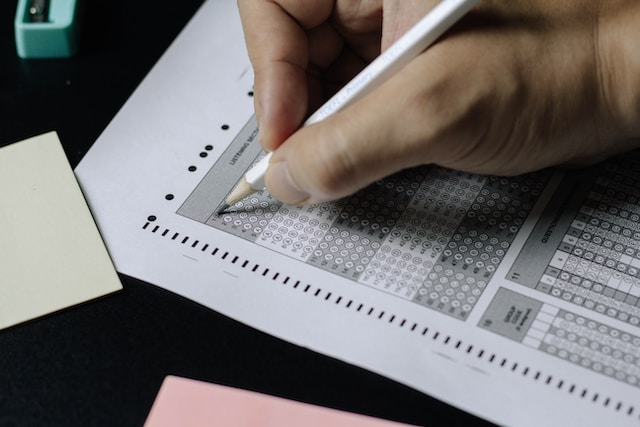Two words: Gifted. Kid.
If you’re a student with a low GPA but a high SAT/ACT score, you’re likely a gifted kid. This means you could pass tests using your talent but can’t motivate yourself to fulfill your potential in class.
Okay, let’s address a common question: is it possible to have a low GPA but a high SAT/ACT score without being a gifted kid?
Sure!
However, it’s not as frequent.
Most students with a low GPA but a high SAT/ACT score are gifted because their standardized test scores correlate well with fluid intelligence. So, their IQ, or intelligence quotient, helps them pass standardized tests with flying colors.
Now, we know what you may think: “Shouldn’t a high IQ also help you get a high GPA?”
Sometimes.
Some students with high standardized test scores find academic activities incompatible with their learning style. Thus, they fail to finish their homework on time or pass their classes with minimal effort.
This is the problem with many gifted yet disagreeable students: while their high IQs earn them high test scores, their learning style makes maintaining academic performance difficult. They’re smart and full of potential; but, they can’t meet said potential.
Nonetheless, everyone deserves a shot at getting into college.
Yes, that means you too, dear reader.
If you’re a gifted student who passed their standardized tests with flying colors, yet couldn’t motivate themselves to earn As in class, then this article is for you.
In this article, we’re going to be covering everything you need to know about how to get into college with a low GPA but a high SAT/ACT score.
Table of Contents
- Is it Possible to Get Accepted Into College With a Low GPA but a High SAT/ACT Score?
- Do Colleges Care More About the SATs and ACTs or the GPA?
- Why the College Essay is Your Best Friend.
- How to Write Your College Essay About Having a Low GPA but a High SAT/ACT Score.
Is it Possible to Get Accepted Into College With a Low GPA but a High SAT/ACT Score?

Yup!
If you have a low GPA but a high SAT/ACT score, you can still get accepted into university. In fact, it’s still possible to get accepted into rather prestigious schools despite a lower GPA.
Now, there are exceptions.
Depending on how low your GPA is, you may have a lower chance of getting accepted into a decent school even with a low SAT/ACT score; and, in some cases, it can be interpreted as laziness or wasted potential (a massive red flag.)
Let’s say for instance you wanted to get accepted into NYU.
This is NYU’s GPA statistics for the 2020-21 admissions cycle. We’ve posted a photo below.

As you can see 85% of students had a GPA above 3.5. If you were applying for NYU during the 2020-21 admissions cycle with a GPA less than 3.5, you’d be competing against 85% of accepted students who would have had a higher GPA than you. That could make things quite difficult and competitive.
Now, if you had a GPA above 3.5 and below 3.75, would you still be at a disadvantage? Sort of. You’d be competing against 45% of other students with a stronger GPA; but, it could be worse.
As a general rule, if you’re applying to college with a low GPA but a high SAT/ACT score, you can still get in. But, you’ll need to compensate for your low GPA with other factors like strong projects, extracurriculars, and essays.
Additionally, your class rigor could help explain some of the reasons behind your lower academic performance. A student with a 3.85 GPA but a lot of AP courses may be more impressive than a student with a 4.0 GPA with no upper-level courses.
If you’re applying to college with a low GPA due to class rigor, be sure to explain this detail in your essays or additional comments sections of your application. It can certainly provide a lot of much-needed context to admissions officers, and arguably make or break your admissions chances.
Do Colleges Care More About the SATs and ACTs or the GPA?

This is a question we get all the time.
In fact, a lot of test prep centers would be asked about the importance of the SATs and ACTs in comparison to the GPA. What if my GPA is high but my ACT is low? What if my GPA is low but my SATs are high? What if both? What if neither?
What if, what if, what if?!
Despite how common these questions are, the answer is actually quite simple: some schools weigh the SATs and ACTs more than others. But, your GPA is often more important than your standardized test scores.
Note: GPA and standardized tests aren’t judged in a binary manner. They are factors that help admissions officers make an assessment of you; and, this can come in many forms. A low GPA may indicate incompatibility with academic settings. Or, it could be a financial strain. Or, inattentiveness. High SAT/ACT scores could mean high IQ. Or, just a lot of practice. The reality is that your performance in both these dimensions won’t be judged as simply as you think.
An easy way to determine whether your dream school values SATs/ACTs or GPA more is to just look at their Common Data Set.
Search [School Name] followed by [Common Data Set] on Google. Often, the first option will show you a pdf containing the school’s data on admissions including how heavily they weigh admissions factors like test scores and grades.
Let’s show the Common Data Set for Brown University, for instance.

As you can see, Brown values one’s academic GPA far more than test scores. So, you’re not going to be at much of an advantage here if you have a high SAT score but a low GPA.
However, you should also note that the application essay is also valued very heavily. It’s valued as heavily as the class rank, GPA, Rec letters, and class rigor. This is good news since a lot of schools use the application essay and other supplementary written information to provide a holistic assessment of your performance.
So, even if you don’t do well in your test scores, you can likely explain your reasoning in the essay and hopefully (if your writing is strong enough) convince admissions officers to take a chance at accepting you into their institution.
Speaking of college essays, this brings us to our next point.
Why the College Essay is Your Best Friend.

If you’re applying to college with a low GPA but a high SAT/ACT score, you will NEED to have a strong college essay.
The college essay is going to be your best friend. Don’t think of it as an obstacle to get through. Instead, consider it an asset that may save your admissions chances.
How can it save your admissions chances, you may ask?
Well, it’s one of the few qualitative factors in the college admissions process.
Quantitative college admissions factors are elements of your application that can be judged by numbers and numbers alone. These include your class rank, standardized test scores, and, of course, your GPA.
Qualitative factors are elements outside of basic numbers and stats that describe your performance. So, things like your extracurriculars, personality, and college essay all fall under this category.
Qualitative factors are the primary measurements admissions officers use to provide you with a holistic admissions decision. It’s how they can have a deeper understanding of your performance and background —and more importantly, explain your reasons for a low GPA.
This is one of the few chances to explain your background and elaborate on your shortcomings to admissions officers. Some students can write essays strong enough that their severely low GPAs are overlooked, and they are accepted into some of the most prestigious schools in the nation.
It’s up to you to make a strong college essay that compensates for your shortcomings.
If you have a low GPA due to a lack of resources available to study and perform, you’ll need to write that in.
You’ll need to write that in if you have a low GPA due to external traumas such as financial troubles or familial struggles.
If, like most students, you have a low GPA but a high SAT/ACT score because you were a gifted kid who could take tests but couldn’t do school, you’ll need to write that in.
And, chances are, the reasons why you have a low GPA but a high SAT/ACT score are more complicated and full of unconscious reasons than you may expect. You’ll need to write and elaborate on these complexities in an articulated and effective manner.
We’ll show you how to do exactly that in the next section below.
How to Write Your College Essay About Having a Low GPA but a High SAT/ACT Score.

There are plenty of successful college essays (and additional comments statements) that explain their wide disparity in GPA and standardized test score performance. All of them vary in both topic and complexity.
Nonetheless, they all have one thing in common.
They were persuasive enough for admissions officers to be convinced to take a chance at accepting the student.
The next 5 sections are elements you can write in your essay explaining your low GPA but high test scores. We’ve separated them into 5 parts.
- Honesty.
- Articulation.
- Research.
- Bouncing Back.
- College Readiness.
Let’s get started!
1. Honesty is the Best Policy… Seriously.

This point has been said a million times in our other articles. Yet, it still remains one of the most important tips on how to write solid college essays.
You need to be honest.
It’s very, very tempting to explain your low GPA and high test scores with excuses or random lies. Some students write about how they were Depressed. Some say they had a teacher who was very unfairly discriminatory to them.
But, at the end of the day, they’re lying. And, often, admissions officers can sniff out the lie.
How do they do that? Well, admissions officers have read a million college essays and audited countless students on their claims. They can see the patterns between honest students and liars.
They know.
If you lie in the college essay and the admissions officers catch you, whether through your writing style or through a thorough audit, you’ll lose their trust. And, in the world of college admissions, trust is worth more than gold.
Your first goal when writing a college essay that explains your GPA and SAT/ACT performance disparity is to earn their trust. Be honest with your essays and tell the admissions officers the truth.
If you even so much as flicker a lie in your college essays, you’ve essentially compromised the validity of everything else you’ve written about in your essays. This includes the validity of your performance, academic honesty, and even the validity of your extracurriculars.
2. Be Articulate About Your School Experience.

According to the Merriam-Webster dictionary, being articulate means “expressing oneself readily, clearly, and effectively.”
However, it’s often also used to describe the ability to explain and elaborate complex ideas in a simple and quick manner.
When writing about why you had lower grades but higher test scores, you’ll likely have a complex and difficult experience rooted in your background that explains your disparate performance.
For most students, it’s a hodgepodge of anxiety, depression, being a gifted student who couldn’t fulfill their potential, and a myriad of complex external factors like familial struggles.
No one can understand your reasons for having a lack of performance. But, they can certainly understand your situation better if you elaborate clearly and effectively.
We recommend writing your essay using a notetaking or visual mapping system. So, using a bubble map to draw out your ideas, or even sophisticated notetaking apps like Obsidian, can greatly help you visualize all the complex thoughts in your head.
If you can communicate your reasons for a lack of performance effectively, you make it infinitely easier for admissions officers to sympathize with and understand your struggles. The easier they can empathize with you, the more likely you are to be forgiven for less-than-ideal performance levels.
3. Do the Detective Work.

Most students don’t know why they have a lower GPA.
A lot of our clients here at PenningPapers were told by their teachers, peers, and counselors that their low GPAs were mostly due to a lack of hard work.
However, this is more often than not a very, very bad oversimplification of reality.
For most students, low academic GPA performance is due to multiple factors.
We’ve listed some of the most common factors below. Though, the reasons behind low GPAs are not limited to this list alone.
- Inability to focus due to a lack of executive function. (ADHD)
- Depression.
- Anxiety.
- Reinforced negative associations with particular subjects (told you were bad at Math and therefore manifested that into reality.)
- Familial issues.
- Loud environments that are not optimal for studying.
- tragedies like emergencies or health issues.
- Bullying.
Sometimes, the reasons behind your lower GPA are subtler than you think.
In fact, students with a low GPA but a high SAT/ACT score often realize that the standardized tests say more about their intelligence and potential as great students. It also reveals that there’s something intrinsically wrong with the educational system that they’re in.
For instance, some students are actually very smart and intellectually capable. However, the environment and social structure in their school are oppressive and demeaning to the point of squeezing out any intellectual vitality from students.
This actually happens more often than not.
It could be your case. Or, it could be something else.
You need to do the “detective work” and sort through your educational experience to figure out the factors that actually contribute to your disparity in GPA and standardized test scores.
4. Demonstrate Your Ability to Recover Your GPA.

This is also a very important element of your college essay.
If you want to explain why you have a high GPA but a low SAT/ACT score without appearing like a lazy candidate, you’ll need to prove to admissions officers that you can bounce back. That is, you should show them they can have faith in your ability to earn a high GPA at college.
It’s one thing to have a reason behind your low GPA and high SAT/ACT scores. It’s another to show admissions officers that you can in fact improve over time.
The admissions officers don’t have a need for students who have a reason behind all their failures. They need students who have the right attitude to succeed in the future. That means students need to have a plan for how they’ll be prepared for the institution they’re looking to get accepted into.
Let’s say that you earned a 3.0 GPA but a 1550 SAT score. It’s very clear that a student with a near-perfect SAT score is full of potential and ability. They’re clearly capable of handling the class rigor of a university setting.
But, let’s say that the reason for such a low GPA is that they have a chaotic family background that makes them unable to study and quietly finish their work in peace. The chaos of their family makes for an impossible environment for academic performance to flourish.
A student like this can say in their essay that the campus culture, far distance, and environment of self-starters and independence is going to be perfect for the next stage of their lives. They can both have a better environment more suited for academic work and productivity and have the kind of healthy environment that is crucial for a developing teen to mature into adulthood.
Sounds good!
Now, here’s another example.
Let’s say that you have a bad GPA because you were in a bad position in life. That is, you were fighting through Depression and didn’t have the right community and culture to surround you and lift you up in support.
This is a great reason to funnel into university.
You can write about how the environment in your area was not ideal for any student struggling with mental health, especially those who were depressed. But, it was when you were away from your general region or isolated from them in a new environment that you noticed your academic performance and mental health improving.
Thus, the next step in your adventure is in a university that would be accepting and loving of all people regardless of their background or history. In this essay, you may write about how you have mostly recovered and are ready for the college experience. But, the culture and environment of support at the university would help you increase your academic performance and achieve goals that you have always hoped and deserve to earn.
Speaking of readiness, that brings us to the next point!
5. Show You’re Ready for College.

Admissions officers are trying to answer one question.
Are you ready for the college you’re applying for?
Let’s be real here: most students are not ready for college. College is filled with a plethora of unique experiences, all with their own ways of helping you grow and develop over time. You are going to be faced with both challenges and opportunities; and, at times, they both overlap with one another.
In the world of college, you’re going to be faced with these challenges. So, it’s critical that you show the admissions officers that despite your low GPA you’re capable of handling the challenges ahead.
How would they know this?
Well, the best way of determining that isn’t really in what you say.
It’s actually in the attitude.
If you demonstrate in your college essay a mature and profoundly sophisticated mindset that is humble and excited for the future, admissions officers can have faith that you will be ready to face the challenges ahead of you.
However, if you’re constantly emphasizing excuses, making up reasons for failure, and grabbing at straws to try to desperately convince admissions officers to turn a blind eye toward your GPA, they won’t think you’re mature enough to attend their campus.
Funnily enough, the best way you can do this is to recognize that at least to some degree the reason behind your low GPA was your fault.
Are there reasons beyond you?
Sure!
But, for most if not all students, your reasons for a low GPA are at least in some part due to your own inability. And, the quicker you can accept that with grace and humility, the more of a chance you have of convincing admissions officers that you truly are capable of handling adversity with the right mindset.
If you still have questions about how to get into college with a low GPA but a high SAT/ACT score, you may want to consider speaking with one of our expert college admissions consultants and advisors. Schedule a free consultation, and we’ll get back to you within 24 hours to discuss how we can help you get into the school of your dreams. We’ll help with everything including ECs lists, essays, and general advising and consulting!

